Have you lost your mother, father, brother, sister, friend, or spouse recently?
Are you struggling with dealing with your loss?
Do you need bible verses to comfort and strengthen your soul?
It is almost impossible to describe the pain of losing a loved one.
When you are utterly distraught about your loss, there are scriptures about death that can encourage you.
God knows all things, and he is aware of what you are going through.
In 2009, while I was still in medical school, I received the news of my mother’s demise.
That moment shaped my life and still affects me to this day.
About a year before she passed on, she was diagnosed with hemorrhagic stroke – A condition where blood vessels burst in the brain leading to body weakness and unconsciousness.
Despite making a satisfactory recovery, the devil suddenly struck.
It was a painful experience that is difficult to explain.
Nonetheless, I stayed strong, reflecting on some powerful bible verses.
God has promised us eternal glory if we work circumspectly in his ways.
Therefore, if you’ve lost your mum, dad, brother, husband, wife, or best friend, Christ has promised us hope.
Through the resurrection, our bodies will be transformed, and we will have eternal life.
Here are Bible verses about death to comfort your soul.
Recommended for you
- 24 Bible verses about life after death
- A prayer for hope for things to be better
- Powerful bible verses about hope in difficult times
- To Live Is Christ To Die Is Gain Bible Verses
Bible verses about Death
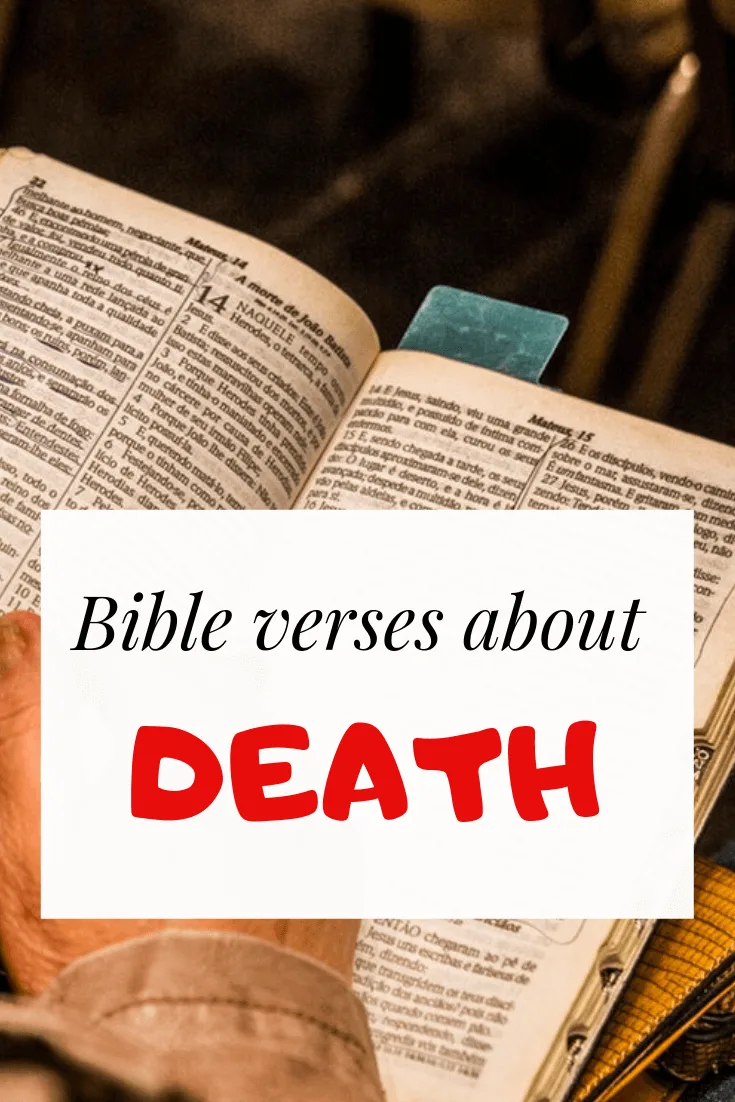
1. Revelation 21:4 – There is hope for eternal glory

And God shall wipe away all tears from their eyes; and there shall be no more death, neither sorrow, nor crying, neither shall there be any more pain: for the former things are passed away
The book of Revelation houses a verse of unique consolation. Revelation 21:4 depicts a future free from suffering and death. It’s a vision of eternal glory that provides comfort during times of loss.
He will wipe away every tear from their eyes, and death shall be no more.” This verse unveils God’s ultimate plan. It promises a world without pain, mourning, or death. But what does it entail?
Isaiah 65:17 holds an answer. God’s voice declares the creation of new heavens and a new earth. The sorrows of the past? They’ll fade into oblivion. This prophecy strengthens the promise of Revelation, painting a clear image of our heavenly future.
2 Peter 3:13 echoes the same message. It speaks of a new creation, free from sin and its greatest consequence—death. These promises shape our perception of death, portraying it not as an end, but as a gateway to a brighter existence.
Consider the death and resurrection of Jesus Christ, an integral event recorded in Luke 24:1-7. In His victory over death, Christ not only affirmed His divinity but also paved the way for our own resurrection and eternal life. His resurrection illuminates our path, guiding us toward the eternal glory promised in Revelation 21:4.
Now, let’s delve into a real-life story. Dietrich Bonhoeffer, a German pastor, faced death bravely. His unwavering faith, even amidst Nazi terror, was fueled by hope in eternal glory. His story remains a testament to Christian resilience in the face of death.
These divine promises provide comfort. They promise a future where grief, pain, and death are obsolete. This understanding supports us in navigating life and death, anchored in the promise of eternal glory.
In conclusion, the Bible’s teachings inform our perception of death and the afterlife. They offer solace, assuring us that earthly sorrows will be replaced with joy. I encourage you to reflect on the promises of Revelation 21:4, Isaiah 65:17, and 2 Peter 3:13. Embrace them as beacons of hope in the face of death.
2. Romans 14:8
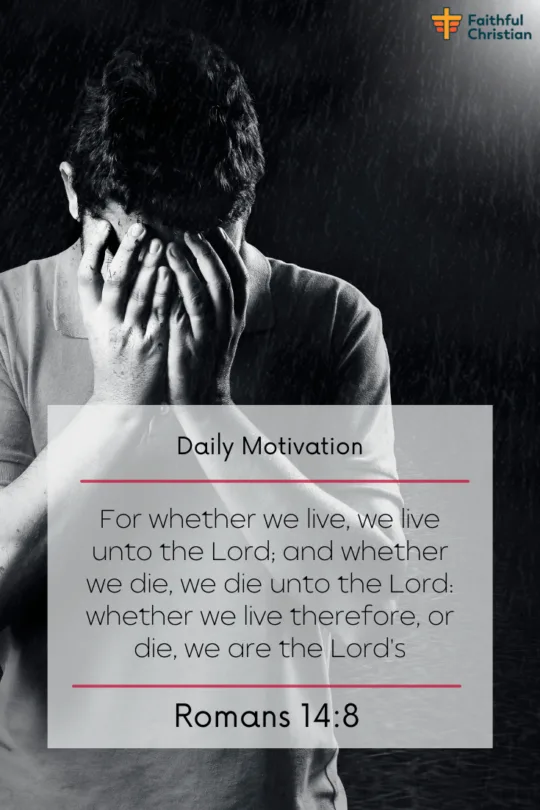
For whether we live, we live unto the Lord; and whether we die, we die unto the Lord: whether we live therefore, or die, we are the Lord’s
Paul’s teachings provide a profound outlook on life and death. In Romans 14:8, he declares, “If we live, we live to the Lord. If we die, we die to the Lord.” Let’s unpack this statement.
First, consider life. It’s not merely an existence, but a spiritual act of worship. Each breath, action, and choice should honor the Lord. Our existence isn’t self-serving, but God-serving.
Next, contemplate death. For Paul, death is a transition, not a termination. It’s the moment we depart our earthly bodies and meet the Lord face-to-face. We belong to the Lord in life and in death.
This perspective aligns with Paul’s message to the Philippians. He affirms, “For me to live is Christ, and to die is gain” (Philippians 1:21). Living serves Christ, while dying ushers us into His presence.
Paul echoes this sentiment in 2 Corinthians 5:8. He states, “We would rather be away from the body and at home with the Lord.” Our physical bodies are temporary. Death releases our spirits into eternal fellowship with God.
The biblical account of Stephen, the first Christian martyr, encapsulates this perspective. Stephen, full of faith, faced a violent death with a serene smile. He saw the heavens open and Jesus standing at the right hand of God (Acts 7:54-60). His life was a testament to living for the Lord. His death was a bold declaration that to die is gain.
In the 20th century, missionary Jim Elliot echoed Stephen’s faith. Despite losing his life to the very people he hoped to evangelize, he lived and died for the Lord.
Romans 14:8 offers a transformative perspective on existence. It challenges us to dedicate our lives and deaths to God. By doing so, we find a meaningful life mission and a hopeful view of death. Let’s embrace this path, finding purpose and hope in the Lord in life and beyond.
3. Ecclesiastes 12:7 – Our spirit will return to God

Then shall the dust return to the earth as it was: and the spirit shall return unto God who gave it
Ecclesiastes 12:7 frames death as a graceful return. It’s not an abrupt halt, but a serene journey back to God, our divine Originator. In Genesis 2:7, God fashions us from dust, endowing us with divine breath. This divine essence breathes life into our bodies, making us more than mere biological entities.
Viewed from this angle, Ecclesiastes 12:7 sheds a comforting light on death. Dust returns to the ground, completing a divine circle of life. And the divine breath? It ascends, returning to God. Death, therefore, isn’t an end, but a transition – an echo of divine symmetry.
2 Corinthians 5:1 extends this comforting narrative. It talks of an “eternal house in heaven,” promising that our spirits, on returning to God, have an everlasting home awaiting them. Our physical bodies – our ‘earthly tents,’ don’t define our existence.
The concept of resurrection and afterlife validates this perspective. When the physical body ceases to exist, it doesn’t signify a complete end. Instead, it paves the way for an eternal life, unified with God. Death thus becomes a portal, leading us to an eternal communion with our Creator.
The Bible beautifully captures this in the narrative of Moses’ death. Following a life of faithful service, Moses returned to dust. Yet his spirit, imbued with divine breath, ascended back to God.
We see this truth reflected in Mother Teresa’s life. Post a lifetime of serving the needy, she returned to dust. But in faith, we believe her spirit, like Moses’, returned to God, the fountainhead of her love and compassion.
To conclude, death is not the final act. We’re more than our physical bodies. We’re vessels of divine breath. And our journey extends beyond our last breath. It’s a transformation – a homecoming to the divine Source.
In that promise, we find solace and peace. It’s this perspective on death that can offer comfort, understanding, and a pathway to peace.
4. 1 Thessalonians 4:14 – We shall rise like Christ

For if we believe that Jesus died and rose again, even so them also which sleep in Jesus will God bring with him
In Christianity, the mention of death often heralds the promise of resurrection. This concept, woven throughout biblical teachings, turns fear of the end into anticipation of a new beginning.
The Apostle Paul, in 1 Thessalonians 4:14, delivers an emblem of hope. For we believe that Jesus died and rose again, and so we believe that God will bring with Jesus those who have fallen asleep in him.”
This statement presents an idea of resurrection akin to Christ’s. The phrase “rise like Christ” suggests not just a return, but an immortal transformation, akin to Jesus’ resurrection.
This theme echoes in 1 Corinthians 15:20, where Christ’s resurrection is referred to as the “firstfruits” of those who have fallen asleep. In biblical terms, “firstfruits” is the best of the harvest, a token symbolizing the full yield to come. Here, it conveys Christ’s resurrection as the assurance of a future resurrection awaiting believers.
The symbolism in Romans 6:5 illuminates this further. Paul links the act of baptism to our spiritual union with Christ in death and resurrection. This vivid imagery conveys a profound spiritual reality – death is a precursor to resurrection.
These verses comfort believers facing death. The promise of eternal life and resurrection reframes death from an end to a transitory slumber before eternity.
The biblical account of Lazarus, brought back to life by Jesus in John 11:38-44, underscores this message. After four days in the tomb, Lazarus emerges, a living testament to Jesus’ power over death. Here, the resurrection promise of 1 Thessalonians 4:14 plays out in real-time, prefiguring the grander resurrection yet to come.
In reality, countless Christians embrace death with hope. Consider evangelist Billy Graham. He often spoke of his imminent death as a gateway to resurrection. Stories like his reflect the hope these biblical promises engender.
In sum, these verses convey that death is not final. It’s a gateway to a glorious resurrection akin to Christ’s. This perspective serves as a comfort, a source of hope, and a reminder of the grandeur awaiting every believer.
5. 1 Corinthians 15:51-57 – we will be transformed into immortality

In a moment, in the twinkling of an eye, at the last trump: for the trumpet shall sound, and the dead shall be raised incorruptible, and we shall be changed.
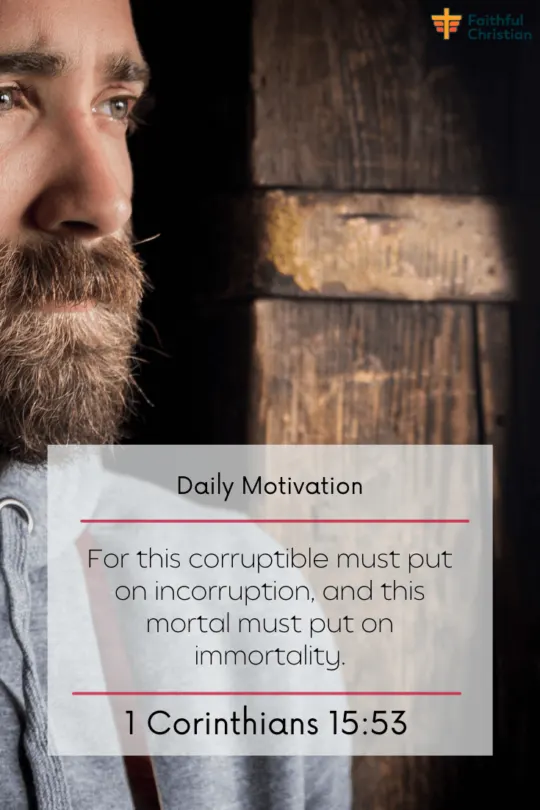
For this corruptible must put on incorruption, and this mortal must put on immortality.
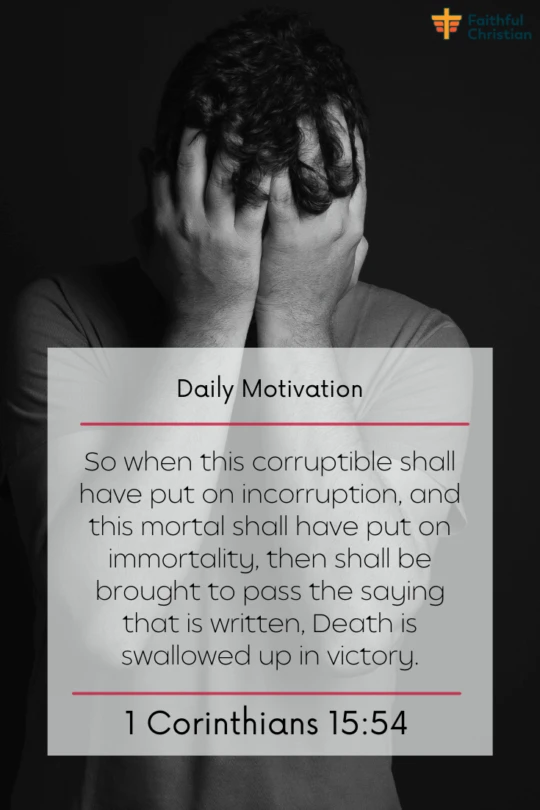
So when this corruptible shall have put on incorruption, and this mortal shall have put on immortality, then shall be brought to pass the saying that is written, Death is swallowed up in victory.

O death, where is thy sting? O grave, where is thy victory? The sting of death is sin; and the strength of sin is the law.But thanks be to God, which giveth us the victory through our Lord Jesus Christ
Delving into the heart of 1 Corinthians 15:51-53, we stumble upon a divine mystery. It teases a future transformation, an evolution from mortality to immortality. It’s a radical shift, but what implications does it hold for our understanding of death?
Enoch’s story provides an illuminating perspective. As Genesis 5:24 recounts, he walked with God, and then he was no more. Enoch’s divine translation bypassed death, offering us a glimpse into our promised transformation.
I’m reminded here of Corrie Ten Boom, a Holocaust survivor. After her ordeal, she dedicated herself to proclaiming Christ’s love. Amidst her trials, she clung to the hope of a transformation, from a life marred by suffering to an immortal existence overflowing with divine love.
Philippians 3:20-21 anchors this hope. We’re reminded of our heavenly citizenship and of Christ’s promise. He will transform our earthly bodies to resemble His glorious body. Death, then, is not the end, but a transition towards a Christ-like existence.
1 John 3:2 reiterates this promise. “We shall be like him,” John asserts, reinforcing the assurance that death is merely a gateway, leading us to reflect Christ’s glory.
So, how does this reshape our understanding of death? Death is no longer a somber finale. Rather, it is a doorway leading to a glorious, eternal life, bringing us ever closer to Christ.
The climax of Paul’s message in 1 Corinthians 15:51-57, though, is the triumphant proclamation: “Death has been swallowed up in victory.” It dissolves the fear associated with death, replacing it with a victorious hope.
In essence, these promises offer two things: Hope for a glorious transformation and assurance of victory over death. We may be mortal, but the promise of an eternal existence in Christ is equally undeniable.
Just like Corrie Ten Boom, these promises inspire us to live with hope and conviction. I am confident that this perspective can provide us with a fresh, empowering view of death.
6. John 14:1-4 – Christ promised us endless glory

“Do not let your hearts be troubled. You believe in God[a]; believe also in me. 2 My Father’s house has many rooms; if that were not so, would I have told you that I am going there to prepare a place for you?

3 And if I go and prepare a place for you, I will come back and take you to be with me that you also may be where I am. 4 You know the way to the place where I am going.”
In life’s darkest hours, comfort emerges from Christ’s words in John 14:1-4. He provides a precious promise: a place prepared for us in His Father’s house. An unending existence, far beyond our mortal lives.
This assurance is not an abstract concept. Christ crafts a specific space for each believer, a divine sanctuary. It’s an offering of eternal peace and communion.
The impact of this promise in times of grief is profound. It redefines death as a gateway to everlasting glory. A transition from temporal to permanent dwelling, as emphasized in 2 Corinthians 5:1. Our earthly homes may crumble, but an eternal residence awaits.
Parallel to this is 1 Peter 1:3-4, depicting an inheritance that can never perish, spoil, or fade. It’s a heavenly legacy for us, unfolding as we traverse from the mortal to the eternal.
These scriptures shape a Christian view of death. It’s seen not as an end or void, but a portal. It’s an entry to everlasting life, a divine inheritance.
The impact of Christ’s promise is timeless, comforting believers throughout history. For instance, the repentant thief on the cross, who recognized Christ as Lord in his last moments, received an immediate assurance of paradise (Luke 23:43). A testament to the prepared place for each believer.
This promise extends beyond the pages of Scripture and into the lives of countless believers throughout history. I recall the powerful story of Martin Luther King Jr.
On the eve of his assassination, he delivered a sermon, expressing that, like Moses, he had seen the Promised Land. His words, uttered in the face of death, echo Christ’s promise of an eternal home, a testament to his faith in the endless glory that awaited him.
In sum, we, as Christians, interpret death not as an end but as a passage. We lean on Christ’s promise, which transforms our view of death from mourning to hope, from loss to eternal gain.
As we encounter death, we journey not to an end, but towards an everlasting home.
7. Romans 8:11

But if the Spirit of him that raised up Jesus from the dead dwell in you, he that raised up Christ from the dead shall also quicken your mortal bodies by his Spirit that dwelleth in you.
In Romans 8:11, we find a remarkable proclamation: the Spirit that resurrected Jesus dwells in us. This verse imparts a transformative promise, intertwining death, resurrection, and spiritual life.
This theme is crucial in Christian theology, as epitomized by Jesus’ resurrection (Matthew 28:1-10). This life from death notion is rooted in the Spirit’s power.
To deepen our understanding, we reference Ephesians 1:19-20. The verse magnifies the scale of God’s power – the same force energizing our spiritual existence.
Colossians 3:1 is another key piece. It urges us to fix our minds on the eternal, mirroring the life-giving shift Romans 8:11 encourages. Here, a correlation exists: infused with God’s Spirit, we should reorient towards the eternal.
Together, these verses compose an edifying image of Christian perceptions on death and resurrection. Death transforms into a resurrection, a birth into a spiritual life. This is showcased in Jesus Christ’s story, His physical death and subsequent resurrection powered by God’s Spirit.
In real life, Nick Vujicic’s story parallels this. Born limbless, he navigated a myriad of adversities. Yet, through faith, he underwent a metaphorical resurrection. Not from physical death, but from hopelessness. Today, he motivates millions with his faith testament – a vivid embodiment of Romans 8:11.
In summary, these verses provide an insightful discourse on death and resurrection. They redefine death not as an end but a gateway to spiritual life, powered by the Spirit. It’s a resilient hope offered to us all, a hope that even reshaped my own perceptions on life and death.
God’s Spirit, the very force that resurrected Christ, has the power to transform us, too. In essence, a life filled with God’s Spirit is a life of resurrection – an everlasting life that begins now.
8. Daniel 12:2
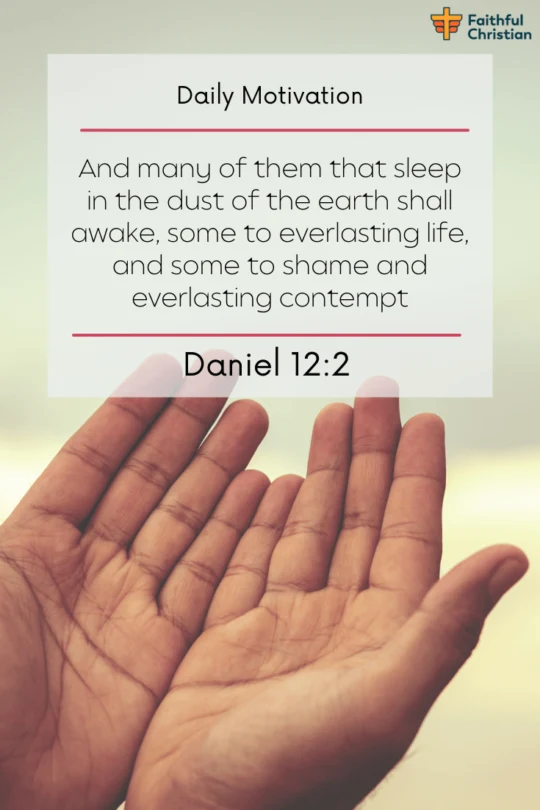
And many of them that sleep in the dust of the earth shall awake, some to everlasting life, and some to shame and everlasting contempt
Pondering life after death? This thought has intrigued us for centuries. Let’s delve into biblical insights about this profound mystery.
The Old Testament, in Daniel 12:2, introduces us to resurrection and eternity. It speaks of life after death. However, it reveals two starkly different outcomes: eternal life or unending contempt.
Intriguingly, Jesus affirms this concept of judgment after death. In John 5:28-29, He forecasts a time when all in their graves will hear His voice. They’ll rise, but not all to eternal life. His words echo Daniel’s prophecy.
Revelation 20:12-13 further elucidates this divine judgment. The Apostle John describes the judgment scene, reiterating that actions in life determine our eternal destiny. These New Testament teachings amplify Daniel’s prophecy, painting a comprehensive picture of death and resurrection.
Take a moment to recall Ezekiel’s vision of the dry bones (Ezekiel 37:1-14). A symbolic representation of resurrection. This prophetic imagery aligns with the resurrection theme threading through both Testaments, emphasizing victory over death.
Remarkably, real-life near-death experiences also echo this biblical hope of resurrection. Many recount experiences of an afterlife, resonating with the scriptural promise of life beyond death.
In essence, these scriptures shed light on death’s mystery. They underscore that death is a mere portal to eternity. However, they remind us that our earthly choices have eternal implications. They encourage us to live with integrity, considering our impending judgment and destiny.
Understanding these scriptures invites faith. It reframes death from a grim end to a transformative beginning, opening up to eternal life. I believe in this hope, and I invite you to find comfort in this divine promise too.
Understanding death through these biblical lenses fosters hope, not fear. It redefines death as not a cessation, but a transformation to something eternal.
9. Philippians 1:20
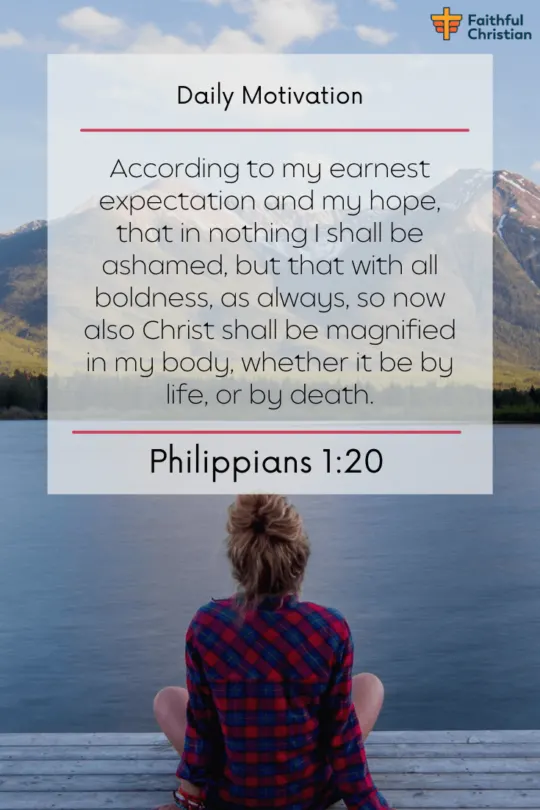
According to my earnest expectation and my hope, that in nothing I shall be ashamed, but that with all boldness, as always, so now also Christ shall be magnified in my body, whether it be by life, or by death.
“Life or death—I magnify Christ.” This essence from Philippians 1:20 reflects Paul’s resolute faith. Paul lived to glorify Christ. He stood firm in his mission, even in the face of death (Acts 20:24).
So, what’s the source of such courage? It lies in understanding the transient nature of present sufferings. Paul knew the earthly trials were fleeting, a shadow compared to the imminent glory (Romans 8:18).
Elisabeth Elliot, a missionary, lived this truth. Following her husband’s murder, she stayed with the tribe they aimed to evangelize. Like Paul, Elisabeth found joy in her steadfast faith, and understood the concept of eternal reward. Her choice to remain came from her commitment to glorify Christ, despite the pain.
Paul’s poignant words in 2 Timothy 4:7-8 resonate with the spirit of Philippians 1:20. In the face of death, he was calm, his faith steadfast. He fought the good fight and finished his race, keeping his faith intact.
He awaited his reward, a crown of righteousness. His words reflect the focus of his life – to live for Christ, and the hope of eternal reward.
As believers, we can learn from these teachings. Life isn’t about avoiding suffering or fearing death. It’s about living to glorify Christ, knowing the promise of an eternal reward. This perspective of life and death has driven many, like Paul and Elisabeth Elliot.
In reflecting on this, let’s aim to emulate their faith. Remember, Philippians 1:20 is a calling, a declaration, a commitment. Life dedicated to glorifying Christ is a life of eternal significance, transcending temporary sufferings. Let our life’s symphony, every note, echo the magnification of Christ.
10. Isaiah 25:8
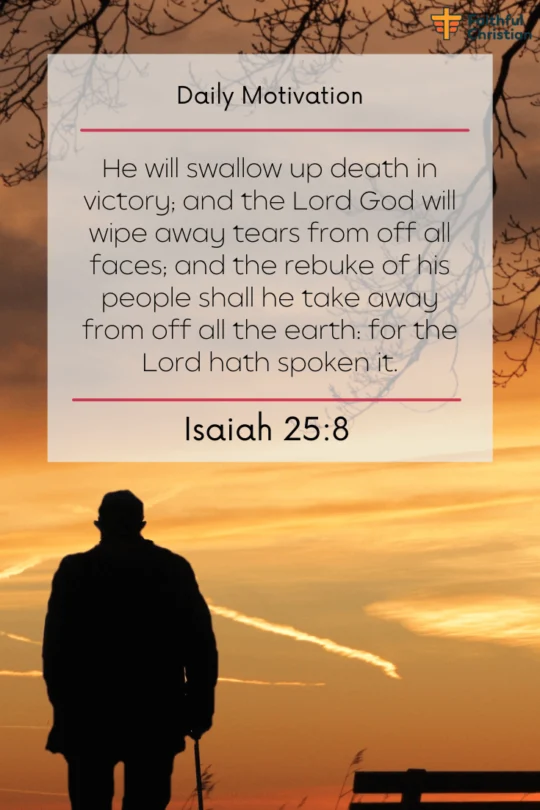
He will swallow up death in victory; and the Lord God will wipe away tears from off all faces; and the rebuke of his people shall he take away from off all the earth: for the Lord hath spoken it.
Imagine a world untouched by sorrow or death. This is the future that Isaiah 25:8 brings to life, promising that God Himself will eliminate all tears and disgrace.
Isaiah 25:8 strikes a chord. It announces a comprehensive victory over death. The imagery, however, is complex, as our world views death as inescapable. But Isaiah provides a hopeful alternative: Death isn’t final but swallowed up in victory.
Take, for instance, the story of King David. His life was a tapestry of triumphs and trials, from slaying Goliath to becoming king, from scandal to seeking redemption. After such a tumultuous life, David passed away peacefully. Death didn’t have the last word. His legacy lived on, his lineage leading directly to Jesus Christ, our Savior.
We see a similar thread in the real-life story of Louis Zamperini, a WWII veteran. Surviving a plane crash, lost at sea, and enduring a brutal Japanese POW camp, he emerged from the war a broken man.
Yet, he found hope and redemption in Christ. Despite all his trials and his eventual death, Louis spoke of a hope that echoed Isaiah’s words – a world where there’s no more pain, no more tears, and death itself is vanquished.
Revelation 7:17 in the New Testament echoes the same victorious sentiment. The verse paints a vivid picture of God eliminating all suffering. 1 Corinthians 15:54 further reinforces the triumph with the phrase: “Death has been swallowed up in victory.”
The message across the Old and New Testaments is consistent. God has promised a world free from the clutches of death. These verses affirm that death is but a passageway, leading to eternal joy and the absence of sorrow.
For us, death is painful. It leaves an irreplaceable void. These verses, however, provide hope, promising that death isn’t an end, but a new beginning.
The promise of God wiping away our tears is awe-inspiring. Sorrow, mourning, and death will all be past experiences. This isn’t only God’s victory but ours too.
In facing life’s trials and the inevitability of death, we should remember these words. They offer the hope of victory over death. Yes, we will weep and mourn. But eventually, we will rejoice. In the end, death will be defeated, replaced by everlasting joy.
Recommended for you
What does the Bible say about death and resurrection?
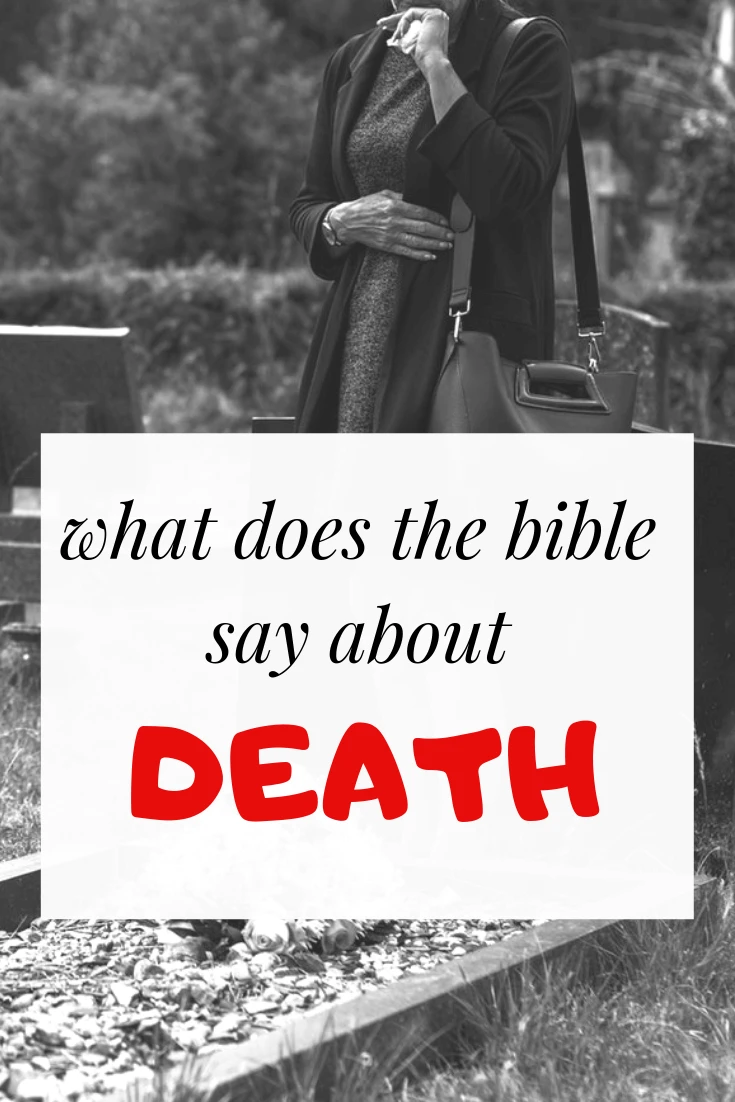
The Bible provides a unique viewpoint on death and resurrection, integrating these concepts into a spiritual narrative. Key examples include Lazarus’s and Jesus Christ’s resurrections.
“Jesus said to her, ‘I am the resurrection and the life… Do you believe this?'” John 11:25. These are Jesus’ potent words when visiting Lazarus’s household. Jesus’ empathetic response to Lazarus’s death underscores his compassion for humanity.
Martha, Lazarus’s sister, confronted Jesus with unwavering faith. Despite her profound grief, Martha declared her belief in the resurrection at the world’s end. Her faith moved Jesus to raise Lazarus from the dead. This account reinforces that resurrection can occur if it aligns with God’s divine plan.
“Yes, Lord,” Martha confirmed, “I believe that you are the Messiah…” John 11:27. Her faith in God remained steadfast during this difficult time, emphasizing the importance of trusting in God’s plan.
This biblical narrative imparts three key lessons:
1. Recognize God’s Boundless Power:
Experiencing a loved one’s death can be devastating, yet it’s crucial to remember God’s infinite power. Trusting in the possibility of resurrection during our lifetime is a testament to this power.
God’s ability to restore life is exemplified in documented instances of modern-day resurrections. Thus, during times of loss, maintaining faith in the potential of resurrection is essential.
2. Embrace the Power of Prayer:
Scripture repeatedly affirms the capacity of prayer to achieve miracles. Examples include Hannah receiving a child through prayer and Daniel’s prayers ensuring his safety in a lions’ den. Prayer, when combined with faith, can lead to miraculous outcomes, such as resurrection.
3. Understand the Promise of the Final Resurrection:
Jesus’s death and resurrection hold a liberating promise. His sacrifice paves the way for our redemption from death, promising us eternal life through faith in him.
“I know he will rise again in the resurrection at the last day,” Martha confidently proclaimed. This declaration emphasizes the Christian belief in a final resurrection and eternal life through Christ.
Recommended for you
- 24 Bible verses about life after death
- A prayer for hope for things to be better
- Powerful bible verses about hope in difficult times
- To Live Is Christ To Die Is Gain Bible Verses
Frequently Asked Questions
How do you overcome death in the Bible?
In biblical teachings, overcoming death refers to a spiritual triumph over physical death through faith in Jesus Christ. John 11:25-26 exemplifies this concept with Jesus stating, “I am the resurrection and the life…whoever lives and believes in me will never die.”
What is a prayer for strength during death?
Here’s a prayer for strength during death: “God, our refuge and strength, we seek Your comfort in our sorrow, Your peace that surpasses understanding, and Your hope in our loss.” This prayer takes inspiration from Psalms 46:1, a biblical affirmation of God’s enduring support.
What does God say about being afraid of death?
Regarding fear of death, the Bible offers comforting reassurances. Hebrews 2:14-15 emphasizes Jesus’s victory over death, stating His purpose to liberate those enslaved by fear of death.
Where is your power Bible verse on death?
1 Corinthians 15:55-57 is a robust declaration of victory over death: “Where, O death, is your victory? Where, O death, is your sting?… But thanks be to God! He gives us the victory through our Lord Jesus Christ.
What is a powerful Bible verse against death?
Romans 6:23, a powerful verse against death, portrays the contrast between death, a consequence of sin, and eternal life, a gift from faith in Christ.
What is a psalm for comfort in death?
Psalm 23, especially verse 4, offers comfort in times of death: “Even though I walk through the valley of the shadow of death…your rod and your staff, they comfort me.”
What does Proverbs say about death?
Proverbs 14:32 talks about death, depicting the righteous finding eternal refuge in God, even in the face of death.
Which Psalm is about death?
Psalm 116:15, viewing the death of faithful servants as precious in God’s sight, can be seen as addressing the sacredness of death.
What Psalm to read near death?
Near death, Psalm 23 provides solace, especially verse 4: “Even though I walk through the valley of the shadow of death…your rod and your staff, they comfort me.”
What is a Bible verse that talks about “rest in peace”?
Matthew 11:28-30, a verse about “rest in peace,” invites the weary to find rest in Jesus, offering a gentle and humble heart.
What are some Bible verses that are against death?
John 11:25-26 serves as a potent verse against death, where Jesus assures eternal life for those who believe in Him, despite physical death.
Which Bible verse provides comfort in times of loss of a father?
For comfort in the loss of a father, Psalm 34:18 conveys reassurance, affirming God’s closeness to the brokenhearted and His salvation for the spirit-crushed.
Can you suggest a short Bible verse for the loss of a loved one?
A brief verse for the loss of a loved one, Revelation 21:4, forecasts a future without death or mourning, where God wipes away all tears.
Is there a specific Bible verse for unexpected death?
For unexpected death, 1 Thessalonians 4:13-14 assures believers not to grieve as those without hope, promising God will reunite them with their deceased loved ones.
What are some Bible verses suitable for a death anniversary?
For a death anniversary, verses like Psalm 34:18 and Revelation 21:4 offer solace, reminding us of God’s proximity in sorrow and the promise of a tearless future.
Is there a Bible verse for the unexpected death of a child?
Matthew 19:14, addressing the unexpected death of a child, quotes Jesus welcoming children into the kingdom of heaven, which provides some consolation.
Which Bible verse provides comfort in times of loss of a mother?
For the loss of a mother, Isaiah 66:13 compares God’s comforting nature to that of a mother, offering solace and comfort in times of loss.
